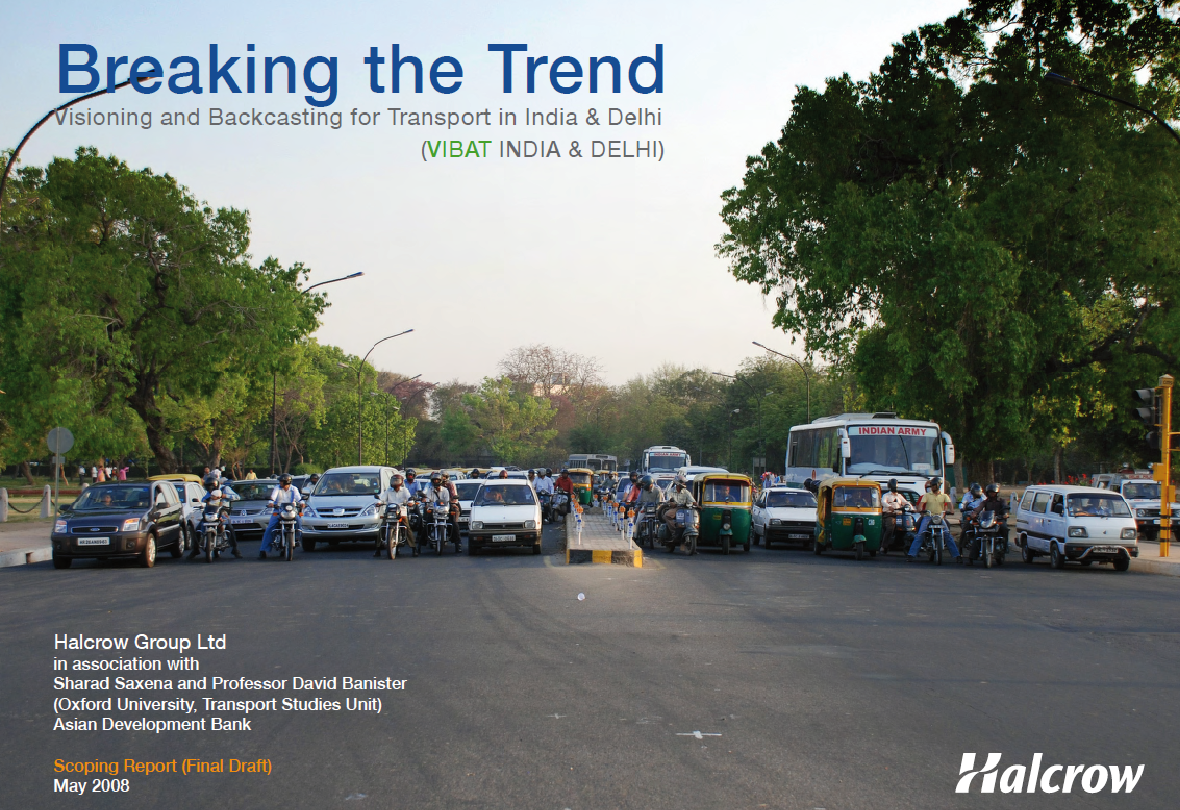Aubrey
Certainly - More than happy to support.
Keep up the pressure and momentum!Regards
Rob
Dr Robin Hickman
Senior Lecturer
Bartlett School of Planning
University College LondonVisiting Research Associate
Transport Studies Unit, University of Oxford
Climate change is a global problem and across the world there are major difficulties being experienced in reducing carbon dioxide (CO2) emissions. The transport sector in particular is finding it difficult to reduce CO2 emissions. This paper reports on two studies carried out by the authors in London (UK) and Delhi (India). It considers the common objectives for transport CO2 reduction, but the very different contexts and baselines, potentials for change, and some possible synergies. Different packages of measures are selected and scenarios developed for each context which are consistent with contraction and convergence objectives. CO2 reduction potentials are modelled and quantified by package and scenario. London is considering deep reductions on current transport CO2 emission levels; Delhi is seeking to break the huge projected rise in transport CO2 emissions. The scale of policy intervention required to achieve these goals is huge and there is certainly little public discussion of the magnitude of the changes required. The paper argues for a ‘strategic conversation’ at the city level, using scenario analysis, to discuss the priorities for intervention in delivering low carbon transport futures. A greater focus is required in developing participatory approaches to decision making, alongside network investments, urban planning, low emission vehicles and wider initiatives. Aspirations towards equitable target emissions may assist in setting sufficiently demanding targets. Only then is a wider awareness and ownership of potential carbon efficient transport futures likely to take place.Stern (2009) builds on and moves beyond this discourse, developing ‘contraction and convergence’ principles (drawing from Meyer and GCI, 2000) and a ‘blueprint’ for change. He makes the link between climate change and poverty, arguing that both issues need to be addressed, hence the strong equity dimension. Stern argues against delaying action and instead that we should invest immediately and substantially in clean technologies and low carbon energy.
Transitions to low carbon transport futures: strategic conversations from London and Delhi
Robin Hickman, Olu Ashiru, David Banister
Beyond 2025 issues relating to personal tradable emissions are discussed - with a view to moving towards a more stringent contraction and convergence global environmental future. Difficulties relating to the costs and administration and likely equity impacts of such a carbon trading scheme, and whether individuals require (or are entitled to) the same number of credits all need to be resolved in the early years to 2015. It is possible that rationing schemes prove unworkable at the individual level and are easier to apply at the industrial level (via the fuel supplier or motor anufacturing company). The latter involves less actors; though a wide public debate and understanding is still required.
Halcrow - Images of the FutureThe Study Team
The VIBAT London core study team is as outlined below: -
- Dr Robin Hickman (Halcrow Group) - Project Coordinator and UrbanBuzz Research Fellow
- Professor David Banister (Transport Studies Unit, Oxford University Centre for the Environment) - Project Director and Urban Buzz Innovation Fellow
- Olu Ashiru (Takedo International and Halcrow Group)
- Sharad Saxena (Transport Studies Unit, Oxford University and intern at Halcrow Group)
- Dr Annabel Bradbury (Halcrow Group)
- Alain Chiaradia (Space Syntax)
- Chris Stutz (Space Syntax)
- Jorge Gil (Space Syntax)
- Jasia Ward (ZupaStudio/Space Syntax)
- Gavin Baily (ZupaStudio/Space Syntax)
Richard McGreevy (GLA Transport Team) and Catherine Jones (TfL) act as steering group
members from the London authorities. Richard McGreevy is an UrbanBuzz Research Fellow.
The lead authors of this stage 2 report were Sharad Saxena, Robin Hickman and David Banister.
This study suggests a 1 tC target for cross-sectoral emissions, based on a Global Commons Institute-typecontraction and convergence regime. This is very ambitious, yet provides a stretch target for policy making. This equates to a target for the transport sector of 0.15 tC per capita (and 95 MtC in aggregate) in India and 0.25 tC per capita (and 2.9 MtC in aggregate) in Delhi.
Breaking the Trend Halcrow Group LtdÂ
Sharad Saxena Dr Robin Hickman and Professor David Banister (Oxford)
Asian Development Bank [ADB]
Why not Follow @aubreygci Why not Tweet this?
Back to UNFCCC Submission Back to Signatory List




